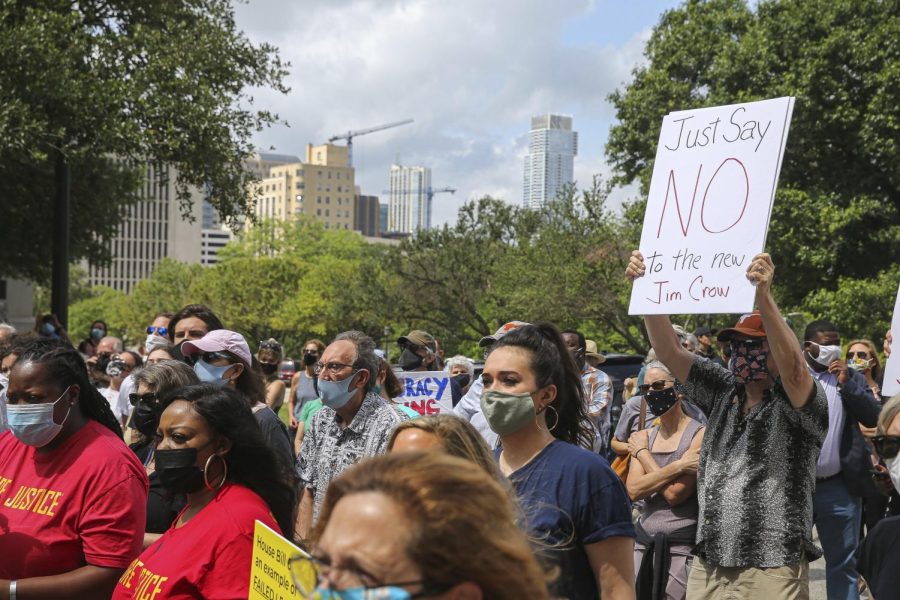We need to talk about voter suppression more
Aaron Martinez /Austin American-Statesman via AP
Hundreds of Texans attend a rally on the steps of the Texas Capitol building in Austin, Texas on May 8, 2021 to oppose voter suppression measures.
November 6, 2022
It is our duty as voters, during the upcoming midterm elections, to keep in mind that active voter suppression continues to exist in our country.
Voter suppression is often viewed as an issue of the past, which, of course, it is.
Some Jim Crow laws, which enforced racist ideals and segregation, aimed to keep African Americans from the polls and began sprouting up in state legislation following the Civil War, lasting for well over a century. Due to the efforts of the Civil Rights Movement, they were thankfully outlawed in the Voting Rights Act of 1965.
However, voter suppression is also very much an issue of the present. On June 25, 2013, the Supreme Court declared, in the court case of Shelby County v. Holder, that Section 4(b) of the Voting Rights Act of 1965 was unconstitutional. Section 4(b) originally granted the federal government the power of pre-clearance regarding voting laws in states with a history of voter suppression, such as Alabama.
Thus today, with that power lost, it remains much easier for such states to pass potentially discriminatory voting laws. In fact, some, such as Texas’ Voter ID law, were even implemented within mere days of state exemption from pre-clearance.
Nearly ten years later, voter suppression still remains an issue on the rise, only becoming more dangerous when it is forgotten.
As the Honorable Supreme Court Justice Ruth Bader Ginsburg expressed in her dissent of the 2013 decision, “Throwing out preclearance when it has worked and is continuing to work to stop discriminatory changes is like throwing away your umbrella in a rainstorm because you are not getting wet.”
According to the Brennan Center for Justice, there have been 42 restrictive voting laws implemented in 21 different states since the beginning of 2021. The year saw a record-breaking amount of voting legislation passed in state governments, much of which restricted voter access to the polls, and legislation in 2022 has only followed suit.
While voter suppression takes many forms, it is especially prominent today in the form of voter ID laws.
Voter ID laws are currently present in 35 states and can be divided by level of severity. For instance, in some states identification is required to vote but a photo is not necessary, such as in Iowa and Colorado, and in others the identification is not considered valid without a photo. In these states there are varying timelines regarding when a voter must return with photo identification for their vote to be counted, such as in Tennessee and Missouri, where the requirement for a photo ID was just implemented in August.
Voter ID laws disproportionately affect communities of color and decrease voter turn-out in minority populations, as found in a 2019 study by political scientists at the University of California San Diego and Michigan State University.
Other contemporary examples of voter suppression include longer wait-times, restrictions regarding mail-in voting ballots and excessive gerrymandering – the redrawing of state lines in an effort to decrease the power of certain groups’ votes.
It is beyond important that we remain aware of these forms of voter suppression, especially with the midterm elections swooping down upon us next week. We must spread education and actively fight against voter suppression in our schools, communities and personal lives.
One way to do this, ironically, is to vote. Positions of power would not bother to suppress the vote if they did not see it a threat or deem it a potential for change, thus we can know with certainty that a step towards equal access in the polls is found in visiting them ourselves.
An example of such change is seen with the John Lewis Voting Rights Advancement Act, currently stuck in the Senate.
This bill, named in honor of the late Civil Rights Movement leader, would return the Voting Rights Act of 1965 to its original full power, and is a powerful act that needs to be passed for the security of all voters.
There is much America, with all its purple mountains’ majesty, does right, but how can we define it as a valid democracy until each citizen has a truly equal opportunity to vote? Opportunity is dependent on accessibility and America is simply not there yet.







